专题09 完形填空 (含答案)-2024-2025学年六年级英语下学期期末专项练习(人教版(PEP))
文档属性
| 名称 | 专题09 完形填空 (含答案)-2024-2025学年六年级英语下学期期末专项练习(人教版(PEP)) | 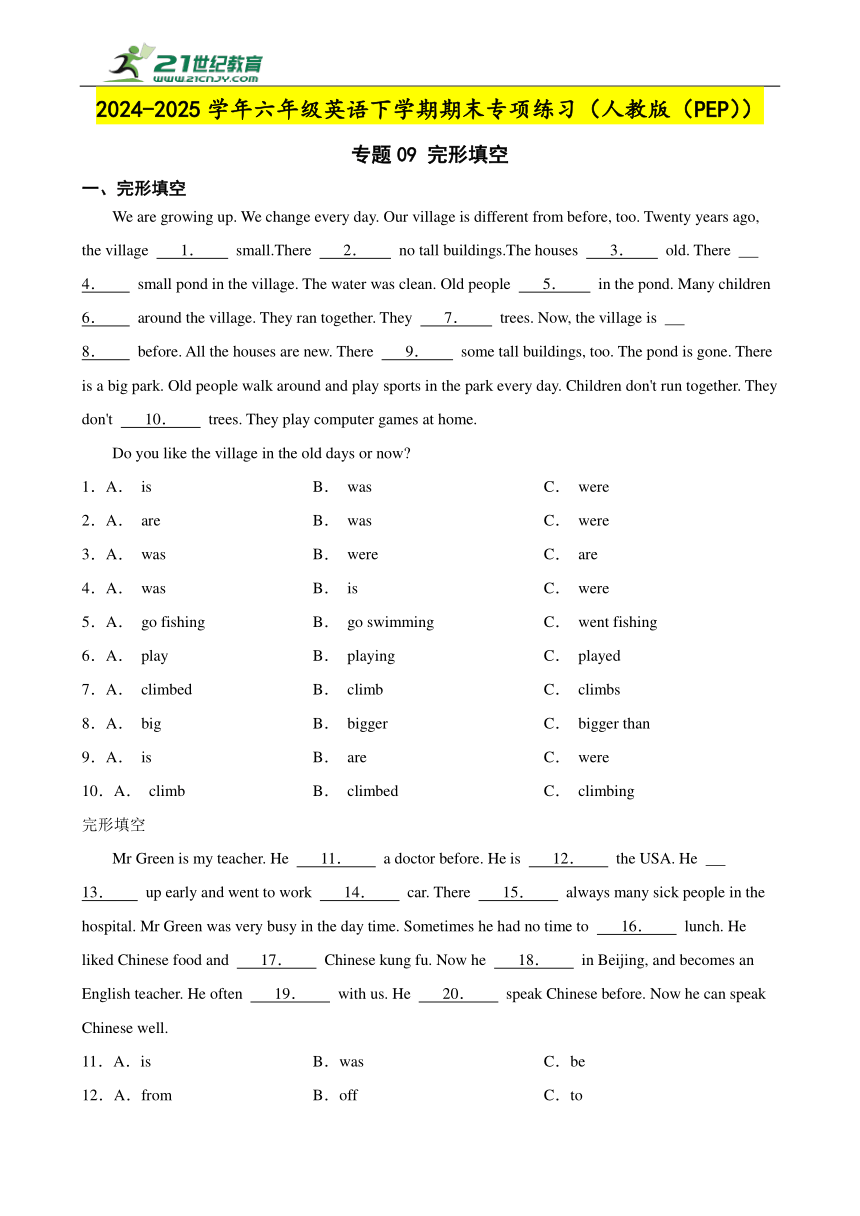 | |
| 格式 | docx | ||
| 文件大小 | 58.9KB | ||
| 资源类型 | 试卷 | ||
| 版本资源 | 人教版(PEP) | ||
| 科目 | 英语 | ||
| 更新时间 | 2025-05-16 09:58:25 | ||
图片预览

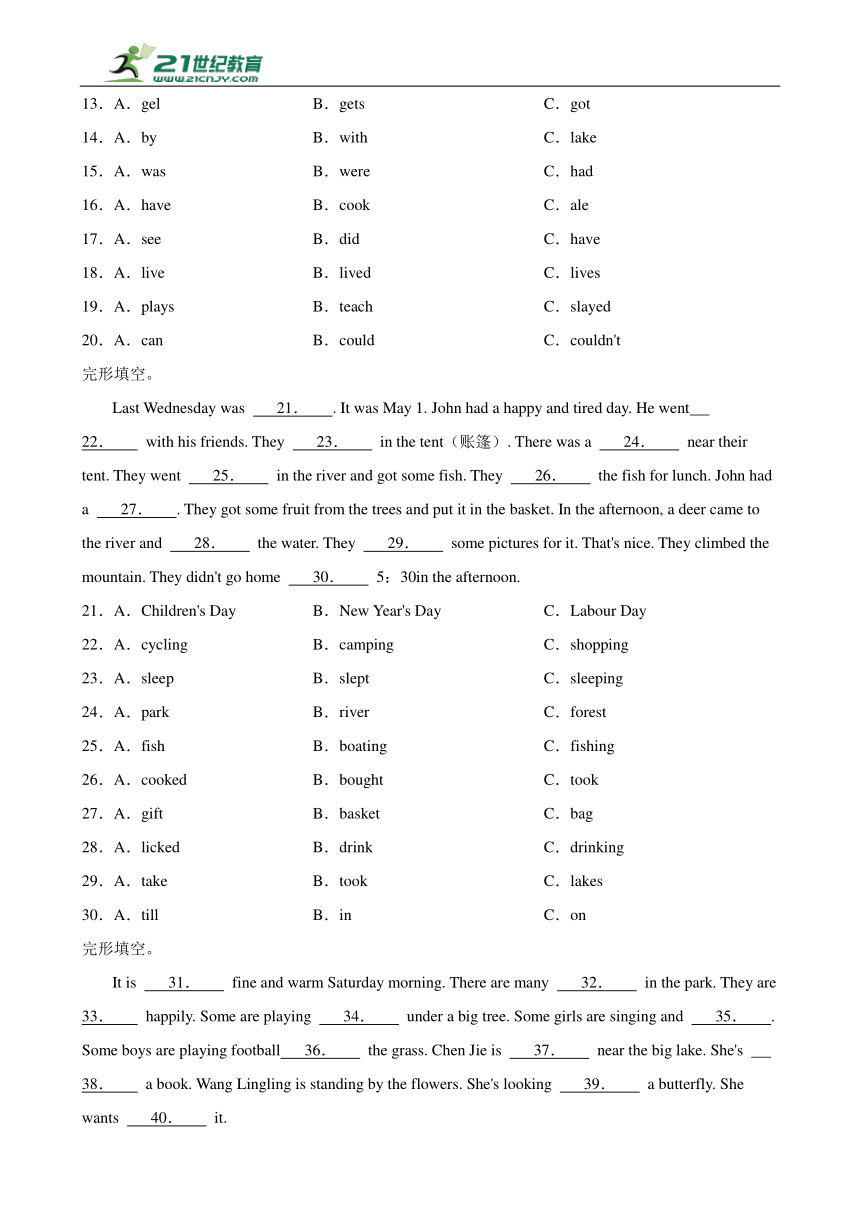
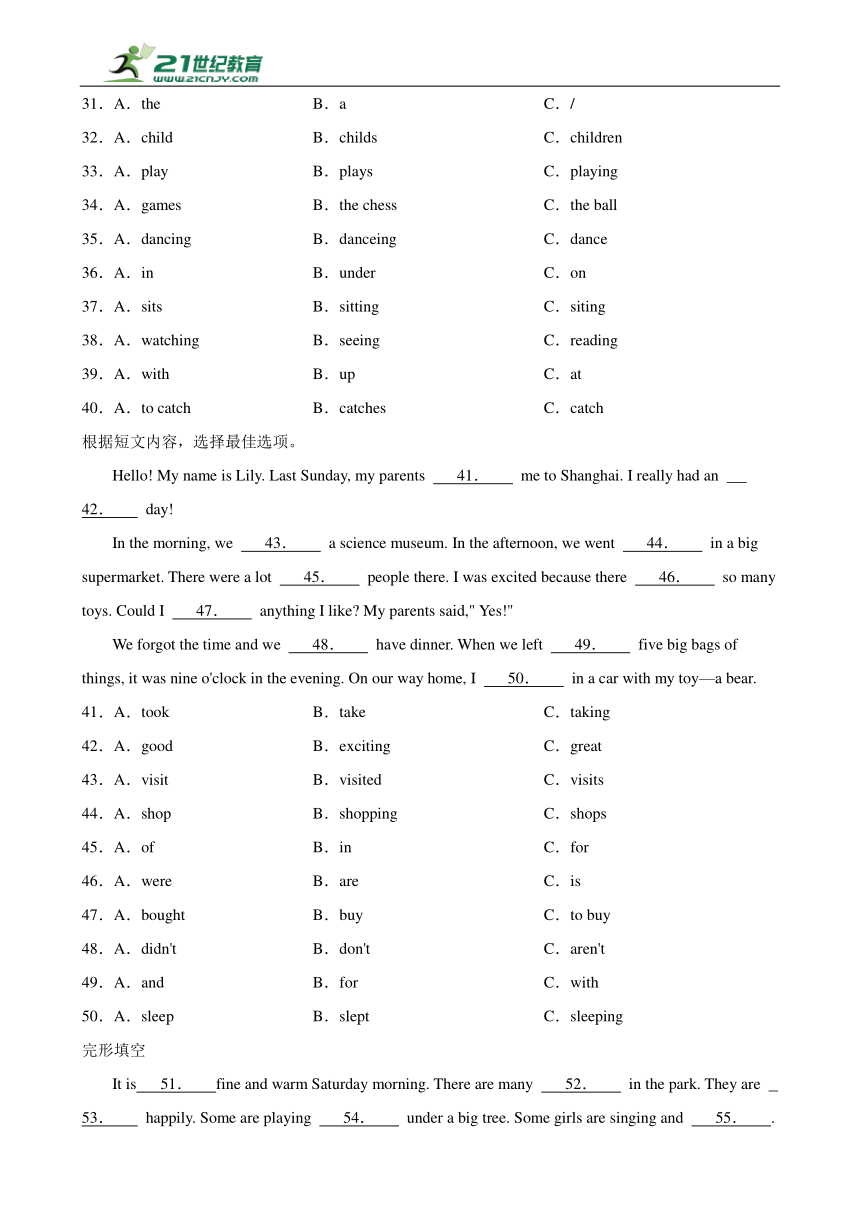
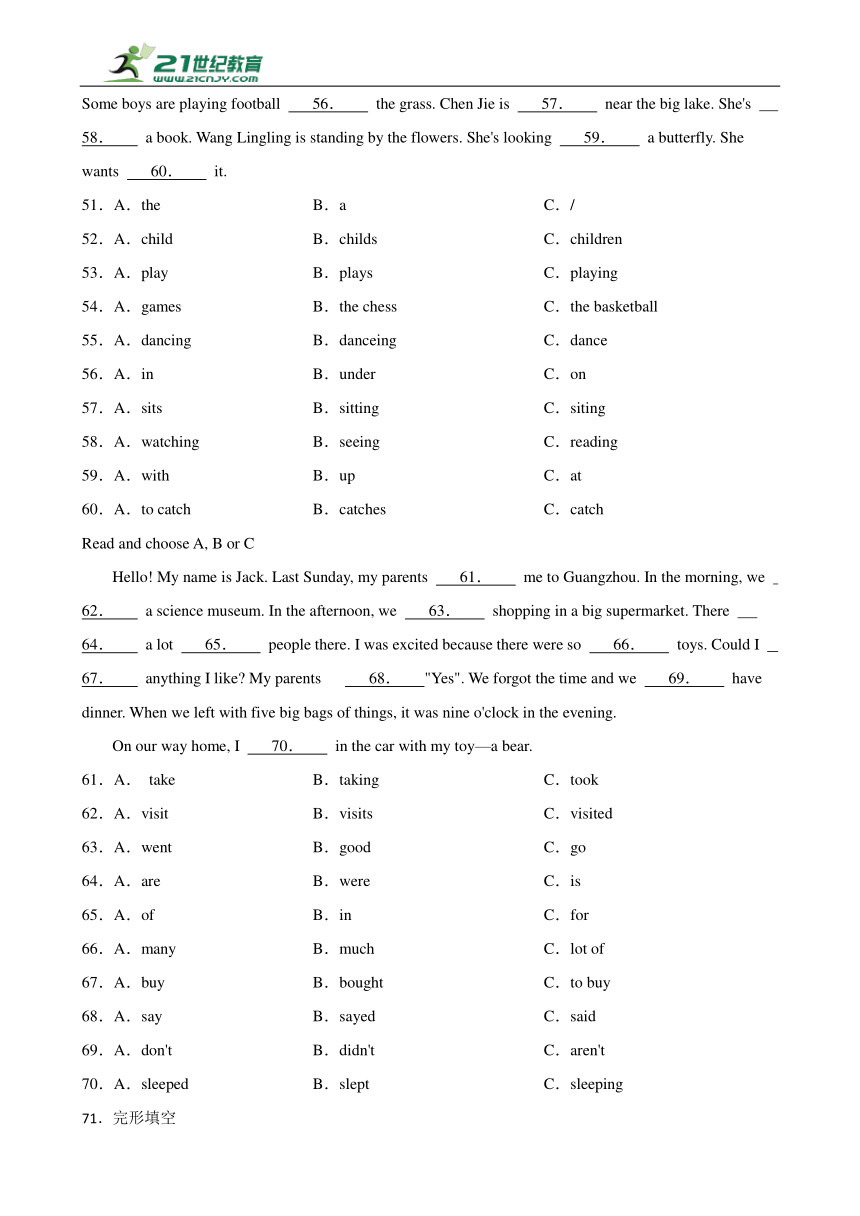
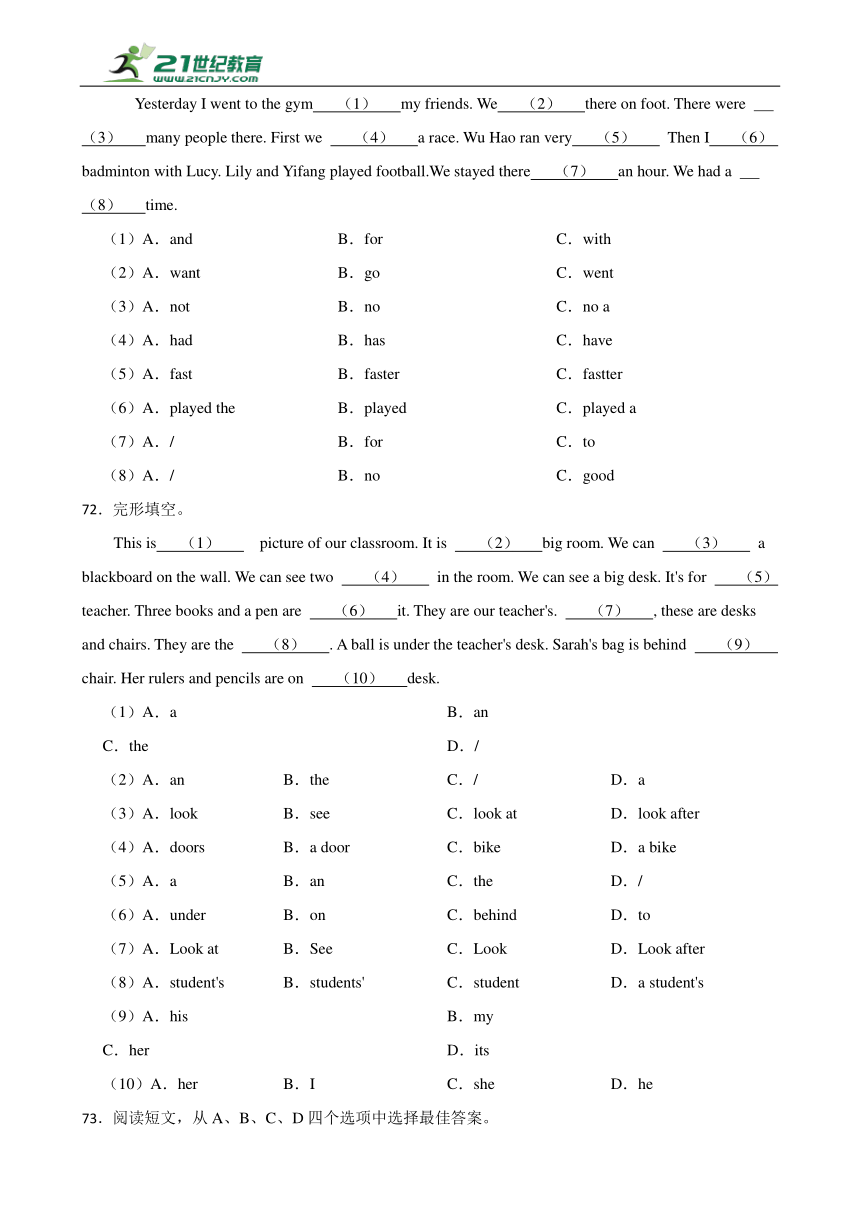
文档简介
2024-2025学年六年级英语下学期期末专项练习(人教版(PEP))
专题09 完形填空
一、完形填空
We are growing up. We change every day. Our village is different from before, too. Twenty years ago, the village 1. small.There 2. no tall buildings.The houses 3. old. There 4. small pond in the village. The water was clean. Old people 5. in the pond. Many children 6. around the village. They ran together. They 7. trees. Now, the village is 8. before. All the houses are new. There 9. some tall buildings, too. The pond is gone. There is a big park. Old people walk around and play sports in the park every day. Children don't run together. They don't 10. trees. They play computer games at home.
Do you like the village in the old days or now
1.A. is B. was C. were
2.A. are B. was C. were
3.A. was B. were C. are
4.A. was B. is C. were
5.A. go fishing B. go swimming C. went fishing
6.A. play B. playing C. played
7.A. climbed B. climb C. climbs
8.A. big B. bigger C. bigger than
9.A. is B. are C. were
10.A. climb B. climbed C. climbing
完形填空
Mr Green is my teacher. He 11. a doctor before. He is 12. the USA. He 13. up early and went to work 14. car. There 15. always many sick people in the hospital. Mr Green was very busy in the day time. Sometimes he had no time to 16. lunch. He liked Chinese food and 17. Chinese kung fu. Now he 18. in Beijing, and becomes an English teacher. He often 19. with us. He 20. speak Chinese before. Now he can speak Chinese well.
11.A.is B.was C.be
12.A.from B.off C.to
13.A.gel B.gets C.got
14.A.by B.with C.lake
15.A.was B.were C.had
16.A.have B.cook C.ale
17.A.see B.did C.have
18.A.live B.lived C.lives
19.A.plays B.teach C.slayed
20.A.can B.could C.couldn't
完形填空。
Last Wednesday was 21. . It was May 1. John had a happy and tired day. He went 22. with his friends. They 23. in the tent(账篷). There was a 24. near their tent. They went 25. in the river and got some fish. They 26. the fish for lunch. John had a 27. . They got some fruit from the trees and put it in the basket. In the afternoon, a deer came to the river and 28. the water. They 29. some pictures for it. That's nice. They climbed the mountain. They didn't go home 30. 5:30in the afternoon.
21.A.Children's Day B.New Year's Day C.Labour Day
22.A.cycling B.camping C.shopping
23.A.sleep B.slept C.sleeping
24.A.park B.river C.forest
25.A.fish B.boating C.fishing
26.A.cooked B.bought C.took
27.A.gift B.basket C.bag
28.A.licked B.drink C.drinking
29.A.take B.took C.lakes
30.A.till B.in C.on
完形填空。
It is 31. fine and warm Saturday morning. There are many 32. in the park. They are 33. happily. Some are playing 34. under a big tree. Some girls are singing and 35. . Some boys are playing football 36. the grass. Chen Jie is 37. near the big lake. She's 38. a book. Wang Lingling is standing by the flowers. She's looking 39. a butterfly. She wants 40. it.
31.A.the B.a C./
32.A.child B.childs C.children
33.A.play B.plays C.playing
34.A.games B.the chess C.the ball
35.A.dancing B.danceing C.dance
36.A.in B.under C.on
37.A.sits B.sitting C.siting
38.A.watching B.seeing C.reading
39.A.with B.up C.at
40.A.to catch B.catches C.catch
根据短文内容,选择最佳选项。
Hello! My name is Lily. Last Sunday, my parents 41. me to Shanghai. I really had an 42. day!
In the morning, we 43. a science museum. In the afternoon, we went 44. in a big supermarket. There were a lot 45. people there. I was excited because there 46. so many toys. Could I 47. anything I like My parents said," Yes!"
We forgot the time and we 48. have dinner. When we left 49. five big bags of things, it was nine o'clock in the evening. On our way home, I 50. in a car with my toy—a bear.
41.A.took B.take C.taking
42.A.good B.exciting C.great
43.A.visit B.visited C.visits
44.A.shop B.shopping C.shops
45.A.of B.in C.for
46.A.were B.are C.is
47.A.bought B.buy C.to buy
48.A.didn't B.don't C.aren't
49.A.and B.for C.with
50.A.sleep B.slept C.sleeping
完形填空
It is 51. fine and warm Saturday morning. There are many 52. in the park. They are 53. happily. Some are playing 54. under a big tree. Some girls are singing and 55. . Some boys are playing football 56. the grass. Chen Jie is 57. near the big lake. She's 58. a book. Wang Lingling is standing by the flowers. She's looking 59. a butterfly. She wants 60. it.
51.A.the B.a C./
52.A.child B.childs C.children
53.A.play B.plays C.playing
54.A.games B.the chess C.the basketball
55.A.dancing B.danceing C.dance
56.A.in B.under C.on
57.A.sits B.sitting C.siting
58.A.watching B.seeing C.reading
59.A.with B.up C.at
60.A.to catch B.catches C.catch
Read and choose A, B or C
Hello! My name is Jack. Last Sunday, my parents 61. me to Guangzhou. In the morning, we 62. a science museum. In the afternoon, we 63. shopping in a big supermarket. There 64. a lot 65. people there. I was excited because there were so 66. toys. Could I 67. anything I like My parents 68. "Yes". We forgot the time and we 69. have dinner. When we left with five big bags of things, it was nine o'clock in the evening.
On our way home, I 70. in the car with my toy—a bear.
61.A. take B.taking C.took
62.A.visit B.visits C.visited
63.A.went B.good C.go
64.A.are B.were C.is
65.A.of B.in C.for
66.A.many B.much C.lot of
67.A.buy B.bought C.to buy
68.A.say B.sayed C.said
69.A.don't B.didn't C.aren't
70.A.sleeped B.slept C.sleeping
71.完形填空
Yesterday I went to the gym (1) my friends. We (2) there on foot. There were (3) many people there. First we (4) a race. Wu Hao ran very (5) Then I (6) badminton with Lucy. Lily and Yifang played football.We stayed there (7) an hour. We had a (8) time.
(1)A.and B.for C.with
(2)A.want B.go C.went
(3)A.not B.no C.no a
(4)A.had B.has C.have
(5)A.fast B.faster C.fastter
(6)A.played the B.played C.played a
(7)A./ B.for C.to
(8)A./ B.no C.good
72.完形填空。
This is (1) picture of our classroom. It is (2) big room. We can (3) a blackboard on the wall. We can see two (4) in the room. We can see a big desk. It's for (5) teacher. Three books and a pen are (6) it. They are our teacher's. (7) , these are desks and chairs. They are the (8) . A ball is under the teacher's desk. Sarah's bag is behind (9) chair. Her rulers and pencils are on (10) desk.
(1)A.a B.an
C.the D./
(2)A.an B.the C./ D.a
(3)A.look B.see C.look at D.look after
(4)A.doors B.a door C.bike D.a bike
(5)A.a B.an C.the D./
(6)A.under B.on C.behind D.to
(7)A.Look at B.See C.Look D.Look after
(8)A.student's B.students' C.student D.a student's
(9)A.his B.my
C.her D.its
(10)A.her B.I C.she D.he
73.阅读短文,从A、B、C、D四个选项中选择最佳答案。
Mr. White and his (1) wanted to do it by decided to paint the outside of their house. To save money they (2) . On Saturday morning they bought some paint and two brushes. They began that afternoon (3) the back of the house. The next Saturday (4) went to a football match while his wife painted the (5) of the house. On Sunday they found they couldn't open (6) of the front windows. They got them all (7) in the end. But they (8) three of the seven which were very expensive to repair. Next time (9) (10) try to save money, they'll certainly pay to do the work.
(1)A.wife B.sister C.daughter D.mother
(2)A.themselves B.himself C.yourselves D.itself
(3)A.and B.for C.of D.from
(4)A.Mr. White B.Mrs. White C.a player D.a painter
(5)A.before B.front C.back D.top
(6)A.any B.some C.every D.no
(7)A.open B.closed
C.broken D.shout
(8)A.broke B.closed C.opened D.shut
(9)A.when B.after C.before D.with
(10)A.someone B.anyone C.everyone D.none
74.阅读短文,从四个选项中选择最佳答案。
Two weeks before Christmas one year, I went to London with my mother. I (1) forget the day. The streets were (2) people. The shop windows were very bright. My mother held my hand and we both went into a toy (玩具)shop. The shop was full of (3) . There were nice toys (4) . Then I saw Father Christmas. I (5) my mother by the hand. “Please (6) me to Father Christmas,” I said. There were (7) children near Father Christmas. They were standing (8) line. Father Christmas spoke to every one of them. At last it was my (9) .“Hello, little Tom,” he said to me. As soon as I heard his (10) I found out that he was my uncle, John Smith.
(1)A.shall never B.don't C.always D.will
(2)A.crowds of B.full of C.many D.fill of
(3)A.students B.children C.women D.man
(4)A.anywhere B.somewhere C.nowhere D.everywhere
(5)A.pulled B.pushed C.got D.caught
(6)A.let B.take C.ask D.bring
(7)A.a lot B.much C.lots of D.few
(8)A.by B.in C.with D.at
(9)A.time B.turn C.toy D.present
(10)A.sound B.noise C.voice D.call
75.阅读短文,从A、B、C、D四个选项中选取最佳答案。
You say you'll have a two-week summer holiday and decide to travel a lot and visit as many new places as possible. I (1) it's a good idea. I'll tell you a story about my friend Mr. Bell. Last July he (2) in Europe. Europe is very beautiful, (3) his holiday was't very nice. He visited four countries, and was in (4) of the countries only three days. He visited quite a lot of museums and famous places, and was always (5) .Bell was on the train or bus almost every day. When he returned (6) Europe, he was very tired.
So I think that you (7) better spend your holiday in a different way. It is (8) to travel with a friend to one country, and visit only one city. Choose a city (9) and you will be able to have a good (10) on the seaside.
(1)A.am sure B.believe C.don't think D.don't hope
(2)A.was B.studies C.worked D.lived
(3)A.with B.and C.so D.but
(4)A.everyone B.either C.each D.all
(5)A.unhappy B.in a worry C.excited D.interested
(6)A.to B.in C.from D.for
(7)A.would B.should C.could D.had
(8)A.better B.happier
C.quicker D.more interested
(9)A.in the countryside B.by the sea
C.with museums D.away from Europe
(10)A.holiday B.swimming C.day D.place
76.从所给的四个选项中选出最佳答案,将其序号填入题前括号内。
A young man (1) himself in Japan with only enough money to buy the ticket for his (2) back home. As he knew that it would take him only two days to (3) home, he decided that he could easily spend the time (4) food. So he bought a ticket and (5) the ship. The man (6) his ears to the sound of the lunch bell. When dinner (7) came, he didn't go to the dining room, (8) that he was not feeling well. The next morning he still didn't have breakfast and at lunch time he again (9) in his room. But at dinner time he was so hungry that he went to the dining room and (10) everything the waiter put in front of him. “Bring me the bill,” he said. “The bill, sir ” said the waiter in surprise. “There isn't any bill. On our ship meals are included in the money for the ticket.”
(1)A.reached B.reach C.found D.found out
(2)A.map B.road C.journey D.plane
(3)A.arrived B.reached C.take D.get
(4)A.on B.with C.without D.near
(5)A.got on B.got off C.runs to D.put on
(6)A.closed B.opened C.stopped D.kept
(7)A.table B.time C.party D.dish
(8)A.says B.said C.say D.saying
(9)A.stayed B.kept
C.walked D.shouted
(10)A.found B.took C.ate D.looked
答案解析部分
1.B;2.C;3.B;4.A;5.C;6.C;7.A;8.C;9.B;10.A
大意:短文讲述了我们村的变化。
本题考查了完形填空,先翻译短文,然后根据短文内容,选择恰当的单词填空,使短文完整。
1.二十年前,这个村子还很小。Twenty years ago二十年前,是一般过去时的时间状语,谓语动词用过去式形式,主语是可数名词单数,be动词用was。故答案为B。
2.没有高楼大厦。根据上文是一般过去时,本句也用一般过去时,可知本句是there be句型,buildings是可数名词复数,be动词用were。故答案为C。
3.这些房子很旧。根据上文是一般过去时,本句也用一般过去时,谓语动词用过去式形式,houses是可数名词复数,be动词用were。故答案为B。
4.村子里有个小池塘。根据上文是一般过去时,本句也用一般过去时,可知本句是there be句型一般过去时,pond是可数名词单数,be动词用was。故答案为A。
5.老人们在池塘……。A去钓鱼,动词原形;B去游泳,动词原形;C去钓鱼,动词过去式。根据上文The water was clean.水很干净。用一般过去时,可知本句也用一般过去时,表示老人们去池塘钓鱼。故答案为C。
6.许多孩子在村子里……。play玩,A动词原形;B现在分词;C动词过去式。根据上文是一般过去时,本句也用一般过去时,谓语动词用过去式形式。故答案为C。
7.他们……树。climb爬,A动词过去式;B动词原形;C动词第三人称单数。根据上文是一般过去时,本句也用一般过去时,谓语动词用过去式形式。故答案为A。
8.现在,这个村子……以前……了。big大的,A形容词原级;B形容词比较级;C比更大的,形容词比较级+连词。now现在,是一般现在时的时间状语,before以前,是一般过去时的时间状语,可知本句表示这个村子比以前更大了,用形容词比较级,than比,与选项C相匹配。故答案为C。
9.也有一些高楼大厦。根据上文是一般现在时,本句也用一般现在时,可知本句是there be句型的一般现在时,buildings是可数名词复数,be动词用are。故答案为B。
10.他们不……树。climb爬,A动词原形;B动词过去式;C现在分词。本句是一般现在时否定句,谓语动词用原形。故答案为A。
11.B;12.A;13.C;14.A;15.B;16.A;17.B;18.C;19.A;20.C
大意:本文介绍了我的老师格林先生。
本题考查了完形填空,注意根据上下文猜测句意。
11.他以前是一位医生。before以前是过去时间,句子时态是一般过去时,动词用过去式。选项B中was是过去式,故答案为B。
12.他......在美国。A:来自,B:离开,C:到。be from来自,故答案为A。
13.他......很早并且......车去工作。句中含有过去式went,说明句子时态是一般过去时。起床get up,get过去式got,故答案为C。
14.他起床很早并且......车去工作。A:乘坐,B:和,C:湖。乘车by car,故答案为A。
15.在医院里,总是有许多病人。这是there be句型,people是复数,be动词用are。句子时态是一般过去时,are过去式were,故答案为B。
16.有时他没有时间......午饭。A:吃,B:做,C:吃。have time to do sth.有时间做某事是固定用法,to后用动词原形,吃午饭have lunch,故答案为A。
17.他喜欢中国食物并......中国武术。A:看见,B:做,C:有。句中含有liked,这是过去式,说明句子时态是一般过去时。and表示并列,前后动词形式一致,练武术do Chinese kung fu,do过去式did,故答案为B。
18.现在他......在北京。A:住在,原形,B:住,过去式,C:住,单三式。now现在是现在时间,句子时态是一般现在时。he是第三人称单数,动词用单三式。live单三式lives,故答案为C。
19.他经常和我们......。A:玩耍,B:教,C:待。often经常用于一般现在时中,he是第三人称单数,其后动词用单三式。选项A是单三式,故答案为A。
20.他以前......说汉语。A:能,B:能,C:不能。before以前是过去时间,句子时态是一般过去时,动词用过去式。根据下文Now he can speak Chinese well.可知,他现在能说汉语,说明以前不能说汉语,不能couldn't,故答案为C。
21.C;22.B;23.B;24.B;25.C;26.A;27.B;28.A;29.B;30.A
大意:本文描述了约翰和朋友一起度过了开心又忙碌的劳动节。
本题考查了完形填空,注意根据句意猜测词义。
21.上周三是......。A:儿童节,B:新年,C:劳动节。根据下文It was May 1.5月1日。根据常识,可知这是劳动节,故答案为C。
22.他和他的朋友去......。A:骑自行车,B:野营,C:购物。根据下文in the tent在帐篷里,可知这是野营,故答案为B。
23.他们在帐篷里......。A:睡觉,原形,B:睡觉,过去式,C:睡觉,现在分词。文章描述了"last Wednesday上周三"发生的事情,句子时态是一般过去时,动词用过去式,故答案为B。
24.在他们帐篷附近有一......。A:公园,B:河流,C:森林。根据下文in the river在河里,可知帐篷附近有条河,故答案为B。
25.他们在河里......并抓到了一些鱼。A:鱼,B:划船,C:钓鱼。根据下文got some fish得到了一些鱼,可知他们抓了一些鱼,说明他们在河里钓鱼,故答案为C。
26.他们午饭......鱼。A:做饭,B:买,C:携带。根据常识可知,午饭他们做了鱼,做饭cook,故答案为A。
27.约翰有一......。A:礼物,B:篮子,C:书包。根据下文They got some fruit from the trees and put it in the basket.他们从树上摘了一些水果,放在篮子里。可知约翰有个篮子,故答案为B。
28.下午,一只鹿来到河边并......水。A:舔,B:喝,原形,C:喝,现在分词。文章描述了last Wednesday上周三发生的事情,句子时态是一般过去时,动词用过去式,故答案为A。
29.他们为它......一些照片。A:拍摄,原形,B:拍摄,过去式,C:湖泊。文章描述了last Wednesday上周三发生的事情,句子时态是一般过去时,动词用过去式。拍照take pictures,take过去式took,故答案为B。
30.下午......5点30分,他们才回家。A:直到,B:在,C:在某天。not...till...直到,固定搭配,故答案为A。
31.B;32.C;33.C;34.A;35.A;36.C;37.B;38.C;39.C;40.A
大意:短文讲述了一个晴朗温暖的周六早晨,公园里有许多孩子,他们玩得很开心。
本题考查了完形填空,先翻译短文,然后根据短文内容,选择恰当的单词填空,使短文完整。
31.是……晴朗温暖的周六早晨。A定冠词,强调特指;B一个,不定冠词,强调名词单数;C不填,本句缺少数量,用不定冠词修饰。故答案为B。
32.公园里有许多的……。A孩子,名词单数;B格式错误;C孩子们,名词复数,many许多的,修饰名词复数。故答案为C。
33.他们玩得很开心。A玩,动词原形;B玩,动词单三形式;C玩,现在分词,be动词不能与动词原形和动词单三形式连用,排除AB。故答案为C。
34.有些人在大树下玩……。A游戏,名词复数;B象棋;C球,play games玩游戏,play chess玩象棋,play balls玩球,固定搭配。故答案为A。
35.一些女孩正在唱歌……。A跳舞,现在分词;B格式错误;C跳舞,动词原形,be不能与动词原形连用,排除。故答案为A。
36.一些男孩正在……草地……踢足球。A在……里;B在……下面;C在……上面,on the grass在草地上,介词短语。故答案为C。
37.陈杰……在大湖附近。A坐,动词单三形式;B正在坐,现在分词;C格式错误,be不能与动词单三形式连用。故答案为B。
38.她……书。A正在看,强调看大型比赛和看电视;B正在看,强调看的结果;C正在读,强调看书或报纸。故答案为C。
39.她在看一只蝴蝶。A和;B向上;C在,look at看,强调看某物。故答案为C。
40.她想……它。A抓住,动词不定式;B抓住,动词单三形式;C抓住,动词原形,want
to do sth.想要做某事,固定搭配。故答案为A。
41.A;42.B;43.B;44.B;45.A;46.A;47.B;48.A;49.C;50.B
短文大意:短文主要讲述上周日莉莉一家人去上海都做了什么。
考查完形填空,平时注意句子的人称和时态及固定搭配。
41.上周五,我的父母……我去了上海。A带着,动词过去式,B带着,动词原形,C带着动词现在分词形式,根据last Sunday上周日,可知句子用一般过去时,动词用过去式,故答案为A。
42.我真的度过了……的一天。A令人愉快的,B令人激动的,C非常棒的,an用于开头以元音音素发音的单词前, exciting开头以元音音素发音,故答案为B。
43.在早上,我们……一个科学博物馆。A参观,动词原形,B参观,动词过去式,C参观,动词单三式,短文在介绍上周日的事情,时态用一般过去时,动词用过去式,故答案为B。
44.在下午,我们在一个大超市里购物,went为go的过去式,购物go shopping,故答案为B。
45.在那里有许多人。许多a lot of,故答案为A。
46.我很激动,引文那里有那么多的玩具。were是are的过去式,are是be动词复数形式,is是be动词单三式,there be有,玩具为负数形式be动词用复数are,句子为一般过去时,be动词用过去式were,故答案为A。
47.我可以买我喜欢的东西吗?A买动词过去式,B买,动词原形,C买,动词不定式,could为情态动词,后跟动词原形,故答案为B。
48.我们忘了时间,我们没有吃饭。A助动词的否定形式,B助动词的一般现在时,Cbe动词的一般现在时。讲的是上周日的事,句子用一般过去时,have为吃,否定形式要助动词did+not完成否定,缩写为didn't,故答案为A。
49.当我们带着五大包东西离开时,已经是晚上九点了。A和,表并列,B为了,C带有,表伴随。我们带着五大包东西离开,东西是随着我们一起来的,表伴随,故答案为C。
50.在我们回家的路上,我和我的玩具——一只熊在车上睡着了。A睡觉,动词原形,B睡觉,动词过去式,C睡觉,动词现在分词形式,讲的上周日的事,句子用一般过去时,动词用过去式,故答案为B。
51.B;52.C;53.C;54.A;55.A;56.C;57.B;58.C;59.C;60.A
大意:本文介绍公园里孩子们正在干的事情。
考查词汇在篇章中的运用能力,做完形填空,首先通过空格读懂文章大意,然后逐一阅读,做出选择,注意时态、语法及固定用法等。
51.这是一个晴朗暖和的星期六早上。此处表达一个,fine是辅音音素开头,因此用a,故选B。
52.公园里有许多的孩子。many后接名词复数,child-children,故选C。
53.他们正玩得很开心。are+doing构成现在进行时,故选C。
54.一些人正在大树下玩游戏。play games,玩游戏,是固定短语,故选A。
55.一些女孩正在唱歌跳舞。and连接并列成分,因此需要doing形式,dance-dancing,故选A。
56.一些男孩正在草地上踢足球。在草地上,用介词on,故选C。
57.陈洁正坐在湖附近。is后接doing,sit-sitting,故选B。
58.她正在看书。read a book看书,是固定短语,故选C。
59.她正在看蝴蝶。look at…看……,是固定搭配,故选C。
60.她想抓它。want to do…想要干……,是固定搭配,故选A。
61.C;62.C;63.A;64.B;65.A;66.A;67.A;68.C;69.B;70.B
大意:短文讲述了有关上周日杰克父母带他去了广州事情。
本题考查了完形填空,先翻译句子,然后根据句子内容,选择恰当的单词填空,使句子完整。
61.上周日。我父母……我去了广州。A带,动词原形;B带,现在分词;C带,动词过去式,根据 Last Sunday可知是一般过去时,本句也用一般过去时,谓语动词用过去式形式。故答案为C。
62.早上,我们……了一个科学博物馆。A参观,动词原形;B参观 ,动词单三形式;C参观,动词过去式,In the morning早上,是一般过去时,谓语动词用过去式形式。故答案为C。
63.下午,我们……一家大超市购物。A去,动词过去式;B好的,形容词;C去,动词原形,本句缺少谓语动词,根据上文用一般过去时,可知谓语动词用过去式形式。故答案为A。
64.那里有很多人。本句是there be句型,根据上文是一般过去时,可知本句是there be句型的一般过去时,people是集合名词,be用were。故答案为B。
65.那里有很多人。a lot of许多,修饰名词复数,固定搭配。故答案为A。
66.我很兴奋,因为有那么……玩具。A许多的,修饰名词复数;B许多的,修饰不可数名词;C没有此形式,toys是名词复数,此处用many修饰。故答案为A。
67.我能……我喜欢的东西吗?A买,动词原形;B买,动词过去式;C买,动词不定式,情态动词could后面接动词原形。故答案为A。
68.我父母……“是的”。我们忘了时间,也……吃晚饭。A说,动词原形;B单词错误;C说,动词过去式,根据上文用一般过去时,可知谓语动词用过去式形式。故答案为C。
69. 我父母说“是的”。我们忘了时间,也……吃晚饭。后半句是否定句,是一般过去时,谓语动词是实义动词,助动词用didn't,表示没有。故答案为B。
70.在回家的路上,我和我的玩具熊……在车里。A单词错误;B睡觉,动词过去式;C睡觉,现在分词,根据上文是一般过去时,本句也用一般过去时,谓语动词用过去式形式。故答案为B。
71.(1)C;(2)C;(3)B;(4)A;(5)A;(6)B;(7)B;(8)C
大意:讲述昨天主人公和朋友们在体育馆的活动。
(1)句意是昨天我和我的朋友们一起去体育馆。根据介词with+人表达和某人一起。故选C。
(2)句意是我们步行去那里。根据句意和过去时态可知,要使用动词went表达去,走。故选C。
(3)句意是那里没有许多人。根据选择内容可知,形容词no可以用来修饰名词people。故选B。
(4)句意是首先我们进行了跑步比赛。根据句意和过去时态可知,要使用had表达进行比赛。故选A。
(5)句意是吴昊跑得非常快。根据句意可知,要使用副词fast来修饰动词ran表达。故选A。
(6)句意是之后我们和露西一起打羽毛球。根据句意和过去时态可知,使用动词固定搭配played+badminton打羽毛球。故选B。
(7)句意是我们会在那里待一个小时。根据句意可知,要使用介词固定搭配for+段时间。故选B。
(8)句意是我们玩得开心。根据句意可知,要使用固定搭配have a good time。故选C。
考查完型填空。注意根据句意来选择合适的单词填空。
72.(1)A;(2)D;(3)B;(4)A;(5)C;(6)B;(7)C;(8)B;(9)C;(10)A
大意:本文介绍了一张关于我们教室的照片。
(1)这是一张我们教室的照片。表示数量一用不定冠词,picture是辅音音素开头,用a,故选A。
(2)它是一个大房间。单数名词前用冠词a。故选D。
(3)在墙上我们能看到一个黑板。墙上的黑板应该是“看到的”,see,故选B。
(4)我们能看见两扇门。房间里应该有两扇门,doors,故选A。
(5)它是给老师的。定冠词the表特指,此处表示讲台是特地给老师的,故选C。
(6)上面有三本书和一只钢笔。书和笔应该是在讲台上,介词on表示“在……之上”。故选B。
(7)看,有桌子和椅子。look放在句首,单独成句,意为“看;瞧”,用来引起某人的注意。故选C。
(8)他们是学生们的。they指代桌椅,复数形式,后面的student也应该是复数形式。此处表示桌椅的归属,使用名词所有格。复数名词的所有格在名词后加' ,意为“……的”。故选B。
(9)萨拉的包在她的椅子后面。her代指上文的Sarah's。故选C。
(10)她的尺子和铅笔在她的桌子上。修饰名词desk用形容词性物主代词。her,她的,故选A。
考查完形填空,首先通读全文,理解大意,其次做题时联系上下文,理解句意和选项意思,根据关键词找出所考查的语法点或者根据语境选择合适的单词,最后再读一遍,确定文章通顺。
73.(1)A;(2)A;(3)D;(4)A;(5)B;(6)A;(7)A;(8)A;(9)A;(10)A
联系上下文意思来分析判断,不要盲目的急于求成,并不是所有的空格都要一次完成,有的空格需要先看下文,再返回去填写,选好答案后,把答案代入文章中,再通读全文,看答案是否合理,单词形式是否适当。
(1)联系上下文,本句意思应该是:White先生和他的太太决定想要粉刷他们的房子外部。故答案为:A。
(2)本句意思是:为了省钱他们自己做。既然是为了省钱肯定是自己动手,Themselves是they的反身代词,意思是他们自己,himself意思是他自己,yourselves是你们自己,itself是它自己,故答案为:A。
(3) 前面提到了他们决定粉刷房子,这里指:他们在下午从房子的后面开始(刷)。from是从……,故答案为:D。
(4)后半句提到his wife粉刷房子,所以前半句应该讲的是Mr. White去看球赛,故答案为:A。
(5)因为短文中提到上个星期六已经刷过房子的后面,所以这句话应该说的是:当他的妻子刷房子的前面时,White先生去看足球赛。front意思是前面,故答案为:B。
(6)句意是:星期天他们发现他们打不开前面的窗户。not …any表示否定,some用于肯定句,every是每个的意思,no意思是不,不能与of连用,故答案为:A。
(7)前一句说的是前面的窗户打不开,后一句又说弄坏了其中的一些,所以这里应该是:最后他们所有的窗户都打开了。open意思是打开, closed是关着的,broken是坏的,shout意思是喊,故答案为:A。
(8)前面由于刚开始打不开窗户,最后打开了,结果是:但是他们弄坏了七个中的三个,修这些坏了的窗户是非常贵的。broke是break的过去式,故答案为:A。
(9)这句是这个故事给人们的提醒:下次当有人要试图省钱的时候,When是当……时候,after是……以后,before是……以前,with是和…… 故答案为:A。
(10)下次当有人试图省钱的时候,someone指某人,anyone指任何人,everyone指每个人,none指没人,故答案为:A。
74.(1)A;(2)A;(3)B;(4)D;(5)A;(6)B;(7)C;(8)B;(9)B;(10)C
本题考查了联系前后文判断句意填单词的能力。
(1)forget是动词原形,前面可能是助动词或情态动词的过去式。C选项总是不是情态动词或助动词,排除。选项B、D都不是过去式,排除。选项A意思是不会。表示不会忘记那一天,应该选择A。
(2)A选项意为大量的,成群结对,人山人海,B选项意为充满,尽是,C选项意为许多,D选项意为使充满,装满,本句句意为:街道里人山人海。只有A选项符合,故答案为A.
(3)本句句意为:商店里尽是......,填什么内容由由前一句玩具店可推测店里尽是玩具或是儿童,A选项意为学生,B选项意为孩子儿童,C选项意为女人们,D选项意为男人们,故可知商店里尽是儿童。故答案为B。
(4)A选项anywhere意为任何地方(一般在疑问句或否定句中),B选项somewhere意为某些地方,C选项,nowhere意为没有地方,哪里都 不,D选项everywhere意为所有地方,没有一处不,本句到处都是漂亮的玩具。到处,即所有地方用everywhere,故答案为D.
(5)本题中A选项pulled意为拉,B选项pushed意为推,C选项got意为得到,D选项caught意为抓到,本句句意为:我用手拉了我妈妈。故答案为A。
(6)本题中A选项意为让,B选项意为带,take me to somewhere意为带我去某地,C选项意为要求,ask sb to do意为要求某人做某事,D选项意为带来,和take相反,take意为带走,本句请带我去圣诞老人那里。故答案为B.
(7)本题中A选项a lot是表示程度的一个短语,意为“很,非常”,B选项much意为许多,是修饰不可数名词的,C选项表示“许多的”,可以修饰可数名词复数和不可数名 词,D选项few表示“几乎没有”,相当于一个否定词,本句有许多儿童在圣诞老人旁边。儿童是可数名词复数,故答案为C.
(8)本题中 A选项by有“被”的意思,还有“使用…”的意思,B选项in的意思是在“在...中,在...里”一般是指在某个空间里,C选项with有多种意思,意 为拥有某物,带来,具有等,D选项at 可以表示“在...,文中站成一排用stand in line,故答案为B。
(9)本题中A选项time意为时间,B选项turn意为“轮到......”,C选项toy意为玩具,D选项present意为礼物,文中最后轮到我了。故答案为B.
(10)本题中A选项sound泛指任何声音,B选项 noise表示噪音,C选项voice一般用于人,指说话、歌唱或发笑的声音.也作鸟鸣声,乐器声音等,D 选项call意为打电话,文中我听到他的声音发现他是我的叔叔。叔叔是人,人发生的声音用voice,故答案为C。
75.(1)C;(2)A;(3)D;(4)C;(5)B;(6)C;(7)D;(8)A;(9)B;(10)A
本题应该先整体的通读文段,然后再通读需要填空的问句,在原文中找到相对应的句子,从选项中找到相符合的,得出答案。
(1)前几句的意思是:你说你有一个两周的暑假,你决定去旅行,尽可能多的去参观些新地方。而后面整篇文章是讲的关于作者的朋友匆忙旅行的故事,结论是he was very tired.他非常累。所以通篇分析全文,本句意思是:我认为这不是一个好主意。是个否定句。故答案为:C。
(2)通过 last year判断这是一个过去时态的句子,studies是一般现在时第三人称单数,错误,worked意思是工作,lived意思是居住,但是都不符合作者 想要表达的意思,作者说的是关于旅游的事情,本句意思是:去年七月他在欧洲。这是一个过去时态的句子,主语是第三人称单数,应用is的过去式。故答案 为:A。
(3)本句前半句的意思是:欧洲非常漂亮。后半句的意思是:他的假期不太愉快。两个句子是转折的关系,故答案为:D。
(4) 前半句意思是:他去了四个国家,everyone是每人,人人, 可单独使用,不与of连用;either意思是也不,用于句末,表示否定;all of意思是所有的,在所有的国家待三天不符合实际情况,each of 意思是每个。因此分析后半句意思是:在每个国家仅仅待三天。故答案为:C。
(5)上一句说他去了四个国家,每个国家只待三天,本句前半句又说他参观了许多博物馆和著名的地方,行程相当的紧张。unhappy意思是不高兴,in a worry 意思是担心,在这里代表慌张。excited意思是兴奋的,interested是有趣的,只有B最符合文中情景,故答案为:B。
(6)本句意思是:当他从欧洲返回时,他非常累。returned是返回的意思, return to意思是返回到……,return from意思是从……返回,选项B和D都不能与return组成固定词组,横线后是Europe,是Mr. Bell 旅游的地方。故答案为:C。
(7)在better后面是给“you”的建议: 用不同的方式度过你的假期, You had better意思是:你最好……,是一个固定的搭配,用于表示建议或愿望,其他三个选项不能与better组成固定词组,故答案为:D。
(8)前面一句提议换一种(与Mr. Bell不同的)旅游方式,后面说的这个方式是:和一个朋友去一个国家旅游,就参观一个城市。是两种出行方式的比较,It is better to…意思是(做什么)比较好,happier意思是更幸福的,quicker意思是更快的,more interested意思是更有趣的,对于出行的方式来说,better更好的最合适,故答案为:A。
(9)给出的句子意思是:选择一个…… 的城市,在后半句的末尾有on the seaside 在海边,in the countryside 意思是在乡下,by the sea意思是海边,with museums意思是有博物馆的,选项D意思是远离欧洲,故答案为:B。
(10)全文就是讲关于假期的,have a good holiday是常用词组,意思是愉快的休假,所以本句意思是:在海边你可能会度过一个愉快的假期。swimming意思是游泳,day意思是天、日子,place意思是地方,故答案为:A。
76.(1)C;(2)C;(3)D;(4)C;(5)A;(6)A;(7)B;(8)D;(9)A;(10)C
本短文考查了动词、形容词、副词、介词的一些基本用法。需要根据人称、关键词、语境来判断如何选择正确的单词。
(1)reach是到达的意思,find是发现的意思,它的过去式是found,find out也是发现的意思,但此处应该填found,故答案为C。ABD都不符合句意。一个在日本的年轻人发现他只有足够的钱去买回家的票。
(2)map是地图的意思,road是马路的意思,journey有旅程的意思,plane有飞机的意思,此处应该填journey,故答案选C。ABD都不符合句意。一个在日本的年轻人发现他只有足够的钱去买回家的票。
(3)Take意思是带走,arrived、reached,get的意思都是到达,get home是固定搭配,表示到家的意思,所以答案选D。据他所知,到达他家会花费他两天的时间。
(4)可知此处应该填一个表示没有意思的单词,只有without意思是没有,其它的都不是,故答案是C。他决定在这两天时间里不吃饭也能熬过去。
(5)got on是上车,上船,got off是下车、下船,runs to是跑向,put on 是穿上,答案是A。所以他买了一张票然后上船了。
(6)closed关上,合上;opened 打开;stopped 停止;kept 保持。所以答案是A。他合上耳朵不去听午餐的铃声。
(7)table桌子,time时间,party聚会,dish菜,故答案选B。当晚餐时间到的时候,他也不去吃晚餐。
(8)ABCD意思都是说的意思,但此处应该填saying,故答案填D。第二天他也没有吃早餐,午餐时间他也呆在房间里。
(9)stayed停留,kept保持,walked行走,shouted大喊。此处应该填stayed,答案是A。说他感觉不舒服。
(10) found发现,took 带走,ate吃,looked看。此处填ate,答案是C。但是在晚餐时间他太饿了所以就去了餐厅吃光了服务员放在他面前食物。
专题09 完形填空
一、完形填空
We are growing up. We change every day. Our village is different from before, too. Twenty years ago, the village 1. small.There 2. no tall buildings.The houses 3. old. There 4. small pond in the village. The water was clean. Old people 5. in the pond. Many children 6. around the village. They ran together. They 7. trees. Now, the village is 8. before. All the houses are new. There 9. some tall buildings, too. The pond is gone. There is a big park. Old people walk around and play sports in the park every day. Children don't run together. They don't 10. trees. They play computer games at home.
Do you like the village in the old days or now
1.A. is B. was C. were
2.A. are B. was C. were
3.A. was B. were C. are
4.A. was B. is C. were
5.A. go fishing B. go swimming C. went fishing
6.A. play B. playing C. played
7.A. climbed B. climb C. climbs
8.A. big B. bigger C. bigger than
9.A. is B. are C. were
10.A. climb B. climbed C. climbing
完形填空
Mr Green is my teacher. He 11. a doctor before. He is 12. the USA. He 13. up early and went to work 14. car. There 15. always many sick people in the hospital. Mr Green was very busy in the day time. Sometimes he had no time to 16. lunch. He liked Chinese food and 17. Chinese kung fu. Now he 18. in Beijing, and becomes an English teacher. He often 19. with us. He 20. speak Chinese before. Now he can speak Chinese well.
11.A.is B.was C.be
12.A.from B.off C.to
13.A.gel B.gets C.got
14.A.by B.with C.lake
15.A.was B.were C.had
16.A.have B.cook C.ale
17.A.see B.did C.have
18.A.live B.lived C.lives
19.A.plays B.teach C.slayed
20.A.can B.could C.couldn't
完形填空。
Last Wednesday was 21. . It was May 1. John had a happy and tired day. He went 22. with his friends. They 23. in the tent(账篷). There was a 24. near their tent. They went 25. in the river and got some fish. They 26. the fish for lunch. John had a 27. . They got some fruit from the trees and put it in the basket. In the afternoon, a deer came to the river and 28. the water. They 29. some pictures for it. That's nice. They climbed the mountain. They didn't go home 30. 5:30in the afternoon.
21.A.Children's Day B.New Year's Day C.Labour Day
22.A.cycling B.camping C.shopping
23.A.sleep B.slept C.sleeping
24.A.park B.river C.forest
25.A.fish B.boating C.fishing
26.A.cooked B.bought C.took
27.A.gift B.basket C.bag
28.A.licked B.drink C.drinking
29.A.take B.took C.lakes
30.A.till B.in C.on
完形填空。
It is 31. fine and warm Saturday morning. There are many 32. in the park. They are 33. happily. Some are playing 34. under a big tree. Some girls are singing and 35. . Some boys are playing football 36. the grass. Chen Jie is 37. near the big lake. She's 38. a book. Wang Lingling is standing by the flowers. She's looking 39. a butterfly. She wants 40. it.
31.A.the B.a C./
32.A.child B.childs C.children
33.A.play B.plays C.playing
34.A.games B.the chess C.the ball
35.A.dancing B.danceing C.dance
36.A.in B.under C.on
37.A.sits B.sitting C.siting
38.A.watching B.seeing C.reading
39.A.with B.up C.at
40.A.to catch B.catches C.catch
根据短文内容,选择最佳选项。
Hello! My name is Lily. Last Sunday, my parents 41. me to Shanghai. I really had an 42. day!
In the morning, we 43. a science museum. In the afternoon, we went 44. in a big supermarket. There were a lot 45. people there. I was excited because there 46. so many toys. Could I 47. anything I like My parents said," Yes!"
We forgot the time and we 48. have dinner. When we left 49. five big bags of things, it was nine o'clock in the evening. On our way home, I 50. in a car with my toy—a bear.
41.A.took B.take C.taking
42.A.good B.exciting C.great
43.A.visit B.visited C.visits
44.A.shop B.shopping C.shops
45.A.of B.in C.for
46.A.were B.are C.is
47.A.bought B.buy C.to buy
48.A.didn't B.don't C.aren't
49.A.and B.for C.with
50.A.sleep B.slept C.sleeping
完形填空
It is 51. fine and warm Saturday morning. There are many 52. in the park. They are 53. happily. Some are playing 54. under a big tree. Some girls are singing and 55. . Some boys are playing football 56. the grass. Chen Jie is 57. near the big lake. She's 58. a book. Wang Lingling is standing by the flowers. She's looking 59. a butterfly. She wants 60. it.
51.A.the B.a C./
52.A.child B.childs C.children
53.A.play B.plays C.playing
54.A.games B.the chess C.the basketball
55.A.dancing B.danceing C.dance
56.A.in B.under C.on
57.A.sits B.sitting C.siting
58.A.watching B.seeing C.reading
59.A.with B.up C.at
60.A.to catch B.catches C.catch
Read and choose A, B or C
Hello! My name is Jack. Last Sunday, my parents 61. me to Guangzhou. In the morning, we 62. a science museum. In the afternoon, we 63. shopping in a big supermarket. There 64. a lot 65. people there. I was excited because there were so 66. toys. Could I 67. anything I like My parents 68. "Yes". We forgot the time and we 69. have dinner. When we left with five big bags of things, it was nine o'clock in the evening.
On our way home, I 70. in the car with my toy—a bear.
61.A. take B.taking C.took
62.A.visit B.visits C.visited
63.A.went B.good C.go
64.A.are B.were C.is
65.A.of B.in C.for
66.A.many B.much C.lot of
67.A.buy B.bought C.to buy
68.A.say B.sayed C.said
69.A.don't B.didn't C.aren't
70.A.sleeped B.slept C.sleeping
71.完形填空
Yesterday I went to the gym (1) my friends. We (2) there on foot. There were (3) many people there. First we (4) a race. Wu Hao ran very (5) Then I (6) badminton with Lucy. Lily and Yifang played football.We stayed there (7) an hour. We had a (8) time.
(1)A.and B.for C.with
(2)A.want B.go C.went
(3)A.not B.no C.no a
(4)A.had B.has C.have
(5)A.fast B.faster C.fastter
(6)A.played the B.played C.played a
(7)A./ B.for C.to
(8)A./ B.no C.good
72.完形填空。
This is (1) picture of our classroom. It is (2) big room. We can (3) a blackboard on the wall. We can see two (4) in the room. We can see a big desk. It's for (5) teacher. Three books and a pen are (6) it. They are our teacher's. (7) , these are desks and chairs. They are the (8) . A ball is under the teacher's desk. Sarah's bag is behind (9) chair. Her rulers and pencils are on (10) desk.
(1)A.a B.an
C.the D./
(2)A.an B.the C./ D.a
(3)A.look B.see C.look at D.look after
(4)A.doors B.a door C.bike D.a bike
(5)A.a B.an C.the D./
(6)A.under B.on C.behind D.to
(7)A.Look at B.See C.Look D.Look after
(8)A.student's B.students' C.student D.a student's
(9)A.his B.my
C.her D.its
(10)A.her B.I C.she D.he
73.阅读短文,从A、B、C、D四个选项中选择最佳答案。
Mr. White and his (1) wanted to do it by decided to paint the outside of their house. To save money they (2) . On Saturday morning they bought some paint and two brushes. They began that afternoon (3) the back of the house. The next Saturday (4) went to a football match while his wife painted the (5) of the house. On Sunday they found they couldn't open (6) of the front windows. They got them all (7) in the end. But they (8) three of the seven which were very expensive to repair. Next time (9) (10) try to save money, they'll certainly pay to do the work.
(1)A.wife B.sister C.daughter D.mother
(2)A.themselves B.himself C.yourselves D.itself
(3)A.and B.for C.of D.from
(4)A.Mr. White B.Mrs. White C.a player D.a painter
(5)A.before B.front C.back D.top
(6)A.any B.some C.every D.no
(7)A.open B.closed
C.broken D.shout
(8)A.broke B.closed C.opened D.shut
(9)A.when B.after C.before D.with
(10)A.someone B.anyone C.everyone D.none
74.阅读短文,从四个选项中选择最佳答案。
Two weeks before Christmas one year, I went to London with my mother. I (1) forget the day. The streets were (2) people. The shop windows were very bright. My mother held my hand and we both went into a toy (玩具)shop. The shop was full of (3) . There were nice toys (4) . Then I saw Father Christmas. I (5) my mother by the hand. “Please (6) me to Father Christmas,” I said. There were (7) children near Father Christmas. They were standing (8) line. Father Christmas spoke to every one of them. At last it was my (9) .“Hello, little Tom,” he said to me. As soon as I heard his (10) I found out that he was my uncle, John Smith.
(1)A.shall never B.don't C.always D.will
(2)A.crowds of B.full of C.many D.fill of
(3)A.students B.children C.women D.man
(4)A.anywhere B.somewhere C.nowhere D.everywhere
(5)A.pulled B.pushed C.got D.caught
(6)A.let B.take C.ask D.bring
(7)A.a lot B.much C.lots of D.few
(8)A.by B.in C.with D.at
(9)A.time B.turn C.toy D.present
(10)A.sound B.noise C.voice D.call
75.阅读短文,从A、B、C、D四个选项中选取最佳答案。
You say you'll have a two-week summer holiday and decide to travel a lot and visit as many new places as possible. I (1) it's a good idea. I'll tell you a story about my friend Mr. Bell. Last July he (2) in Europe. Europe is very beautiful, (3) his holiday was't very nice. He visited four countries, and was in (4) of the countries only three days. He visited quite a lot of museums and famous places, and was always (5) .Bell was on the train or bus almost every day. When he returned (6) Europe, he was very tired.
So I think that you (7) better spend your holiday in a different way. It is (8) to travel with a friend to one country, and visit only one city. Choose a city (9) and you will be able to have a good (10) on the seaside.
(1)A.am sure B.believe C.don't think D.don't hope
(2)A.was B.studies C.worked D.lived
(3)A.with B.and C.so D.but
(4)A.everyone B.either C.each D.all
(5)A.unhappy B.in a worry C.excited D.interested
(6)A.to B.in C.from D.for
(7)A.would B.should C.could D.had
(8)A.better B.happier
C.quicker D.more interested
(9)A.in the countryside B.by the sea
C.with museums D.away from Europe
(10)A.holiday B.swimming C.day D.place
76.从所给的四个选项中选出最佳答案,将其序号填入题前括号内。
A young man (1) himself in Japan with only enough money to buy the ticket for his (2) back home. As he knew that it would take him only two days to (3) home, he decided that he could easily spend the time (4) food. So he bought a ticket and (5) the ship. The man (6) his ears to the sound of the lunch bell. When dinner (7) came, he didn't go to the dining room, (8) that he was not feeling well. The next morning he still didn't have breakfast and at lunch time he again (9) in his room. But at dinner time he was so hungry that he went to the dining room and (10) everything the waiter put in front of him. “Bring me the bill,” he said. “The bill, sir ” said the waiter in surprise. “There isn't any bill. On our ship meals are included in the money for the ticket.”
(1)A.reached B.reach C.found D.found out
(2)A.map B.road C.journey D.plane
(3)A.arrived B.reached C.take D.get
(4)A.on B.with C.without D.near
(5)A.got on B.got off C.runs to D.put on
(6)A.closed B.opened C.stopped D.kept
(7)A.table B.time C.party D.dish
(8)A.says B.said C.say D.saying
(9)A.stayed B.kept
C.walked D.shouted
(10)A.found B.took C.ate D.looked
答案解析部分
1.B;2.C;3.B;4.A;5.C;6.C;7.A;8.C;9.B;10.A
大意:短文讲述了我们村的变化。
本题考查了完形填空,先翻译短文,然后根据短文内容,选择恰当的单词填空,使短文完整。
1.二十年前,这个村子还很小。Twenty years ago二十年前,是一般过去时的时间状语,谓语动词用过去式形式,主语是可数名词单数,be动词用was。故答案为B。
2.没有高楼大厦。根据上文是一般过去时,本句也用一般过去时,可知本句是there be句型,buildings是可数名词复数,be动词用were。故答案为C。
3.这些房子很旧。根据上文是一般过去时,本句也用一般过去时,谓语动词用过去式形式,houses是可数名词复数,be动词用were。故答案为B。
4.村子里有个小池塘。根据上文是一般过去时,本句也用一般过去时,可知本句是there be句型一般过去时,pond是可数名词单数,be动词用was。故答案为A。
5.老人们在池塘……。A去钓鱼,动词原形;B去游泳,动词原形;C去钓鱼,动词过去式。根据上文The water was clean.水很干净。用一般过去时,可知本句也用一般过去时,表示老人们去池塘钓鱼。故答案为C。
6.许多孩子在村子里……。play玩,A动词原形;B现在分词;C动词过去式。根据上文是一般过去时,本句也用一般过去时,谓语动词用过去式形式。故答案为C。
7.他们……树。climb爬,A动词过去式;B动词原形;C动词第三人称单数。根据上文是一般过去时,本句也用一般过去时,谓语动词用过去式形式。故答案为A。
8.现在,这个村子……以前……了。big大的,A形容词原级;B形容词比较级;C比更大的,形容词比较级+连词。now现在,是一般现在时的时间状语,before以前,是一般过去时的时间状语,可知本句表示这个村子比以前更大了,用形容词比较级,than比,与选项C相匹配。故答案为C。
9.也有一些高楼大厦。根据上文是一般现在时,本句也用一般现在时,可知本句是there be句型的一般现在时,buildings是可数名词复数,be动词用are。故答案为B。
10.他们不……树。climb爬,A动词原形;B动词过去式;C现在分词。本句是一般现在时否定句,谓语动词用原形。故答案为A。
11.B;12.A;13.C;14.A;15.B;16.A;17.B;18.C;19.A;20.C
大意:本文介绍了我的老师格林先生。
本题考查了完形填空,注意根据上下文猜测句意。
11.他以前是一位医生。before以前是过去时间,句子时态是一般过去时,动词用过去式。选项B中was是过去式,故答案为B。
12.他......在美国。A:来自,B:离开,C:到。be from来自,故答案为A。
13.他......很早并且......车去工作。句中含有过去式went,说明句子时态是一般过去时。起床get up,get过去式got,故答案为C。
14.他起床很早并且......车去工作。A:乘坐,B:和,C:湖。乘车by car,故答案为A。
15.在医院里,总是有许多病人。这是there be句型,people是复数,be动词用are。句子时态是一般过去时,are过去式were,故答案为B。
16.有时他没有时间......午饭。A:吃,B:做,C:吃。have time to do sth.有时间做某事是固定用法,to后用动词原形,吃午饭have lunch,故答案为A。
17.他喜欢中国食物并......中国武术。A:看见,B:做,C:有。句中含有liked,这是过去式,说明句子时态是一般过去时。and表示并列,前后动词形式一致,练武术do Chinese kung fu,do过去式did,故答案为B。
18.现在他......在北京。A:住在,原形,B:住,过去式,C:住,单三式。now现在是现在时间,句子时态是一般现在时。he是第三人称单数,动词用单三式。live单三式lives,故答案为C。
19.他经常和我们......。A:玩耍,B:教,C:待。often经常用于一般现在时中,he是第三人称单数,其后动词用单三式。选项A是单三式,故答案为A。
20.他以前......说汉语。A:能,B:能,C:不能。before以前是过去时间,句子时态是一般过去时,动词用过去式。根据下文Now he can speak Chinese well.可知,他现在能说汉语,说明以前不能说汉语,不能couldn't,故答案为C。
21.C;22.B;23.B;24.B;25.C;26.A;27.B;28.A;29.B;30.A
大意:本文描述了约翰和朋友一起度过了开心又忙碌的劳动节。
本题考查了完形填空,注意根据句意猜测词义。
21.上周三是......。A:儿童节,B:新年,C:劳动节。根据下文It was May 1.5月1日。根据常识,可知这是劳动节,故答案为C。
22.他和他的朋友去......。A:骑自行车,B:野营,C:购物。根据下文in the tent在帐篷里,可知这是野营,故答案为B。
23.他们在帐篷里......。A:睡觉,原形,B:睡觉,过去式,C:睡觉,现在分词。文章描述了"last Wednesday上周三"发生的事情,句子时态是一般过去时,动词用过去式,故答案为B。
24.在他们帐篷附近有一......。A:公园,B:河流,C:森林。根据下文in the river在河里,可知帐篷附近有条河,故答案为B。
25.他们在河里......并抓到了一些鱼。A:鱼,B:划船,C:钓鱼。根据下文got some fish得到了一些鱼,可知他们抓了一些鱼,说明他们在河里钓鱼,故答案为C。
26.他们午饭......鱼。A:做饭,B:买,C:携带。根据常识可知,午饭他们做了鱼,做饭cook,故答案为A。
27.约翰有一......。A:礼物,B:篮子,C:书包。根据下文They got some fruit from the trees and put it in the basket.他们从树上摘了一些水果,放在篮子里。可知约翰有个篮子,故答案为B。
28.下午,一只鹿来到河边并......水。A:舔,B:喝,原形,C:喝,现在分词。文章描述了last Wednesday上周三发生的事情,句子时态是一般过去时,动词用过去式,故答案为A。
29.他们为它......一些照片。A:拍摄,原形,B:拍摄,过去式,C:湖泊。文章描述了last Wednesday上周三发生的事情,句子时态是一般过去时,动词用过去式。拍照take pictures,take过去式took,故答案为B。
30.下午......5点30分,他们才回家。A:直到,B:在,C:在某天。not...till...直到,固定搭配,故答案为A。
31.B;32.C;33.C;34.A;35.A;36.C;37.B;38.C;39.C;40.A
大意:短文讲述了一个晴朗温暖的周六早晨,公园里有许多孩子,他们玩得很开心。
本题考查了完形填空,先翻译短文,然后根据短文内容,选择恰当的单词填空,使短文完整。
31.是……晴朗温暖的周六早晨。A定冠词,强调特指;B一个,不定冠词,强调名词单数;C不填,本句缺少数量,用不定冠词修饰。故答案为B。
32.公园里有许多的……。A孩子,名词单数;B格式错误;C孩子们,名词复数,many许多的,修饰名词复数。故答案为C。
33.他们玩得很开心。A玩,动词原形;B玩,动词单三形式;C玩,现在分词,be动词不能与动词原形和动词单三形式连用,排除AB。故答案为C。
34.有些人在大树下玩……。A游戏,名词复数;B象棋;C球,play games玩游戏,play chess玩象棋,play balls玩球,固定搭配。故答案为A。
35.一些女孩正在唱歌……。A跳舞,现在分词;B格式错误;C跳舞,动词原形,be不能与动词原形连用,排除。故答案为A。
36.一些男孩正在……草地……踢足球。A在……里;B在……下面;C在……上面,on the grass在草地上,介词短语。故答案为C。
37.陈杰……在大湖附近。A坐,动词单三形式;B正在坐,现在分词;C格式错误,be不能与动词单三形式连用。故答案为B。
38.她……书。A正在看,强调看大型比赛和看电视;B正在看,强调看的结果;C正在读,强调看书或报纸。故答案为C。
39.她在看一只蝴蝶。A和;B向上;C在,look at看,强调看某物。故答案为C。
40.她想……它。A抓住,动词不定式;B抓住,动词单三形式;C抓住,动词原形,want
to do sth.想要做某事,固定搭配。故答案为A。
41.A;42.B;43.B;44.B;45.A;46.A;47.B;48.A;49.C;50.B
短文大意:短文主要讲述上周日莉莉一家人去上海都做了什么。
考查完形填空,平时注意句子的人称和时态及固定搭配。
41.上周五,我的父母……我去了上海。A带着,动词过去式,B带着,动词原形,C带着动词现在分词形式,根据last Sunday上周日,可知句子用一般过去时,动词用过去式,故答案为A。
42.我真的度过了……的一天。A令人愉快的,B令人激动的,C非常棒的,an用于开头以元音音素发音的单词前, exciting开头以元音音素发音,故答案为B。
43.在早上,我们……一个科学博物馆。A参观,动词原形,B参观,动词过去式,C参观,动词单三式,短文在介绍上周日的事情,时态用一般过去时,动词用过去式,故答案为B。
44.在下午,我们在一个大超市里购物,went为go的过去式,购物go shopping,故答案为B。
45.在那里有许多人。许多a lot of,故答案为A。
46.我很激动,引文那里有那么多的玩具。were是are的过去式,are是be动词复数形式,is是be动词单三式,there be有,玩具为负数形式be动词用复数are,句子为一般过去时,be动词用过去式were,故答案为A。
47.我可以买我喜欢的东西吗?A买动词过去式,B买,动词原形,C买,动词不定式,could为情态动词,后跟动词原形,故答案为B。
48.我们忘了时间,我们没有吃饭。A助动词的否定形式,B助动词的一般现在时,Cbe动词的一般现在时。讲的是上周日的事,句子用一般过去时,have为吃,否定形式要助动词did+not完成否定,缩写为didn't,故答案为A。
49.当我们带着五大包东西离开时,已经是晚上九点了。A和,表并列,B为了,C带有,表伴随。我们带着五大包东西离开,东西是随着我们一起来的,表伴随,故答案为C。
50.在我们回家的路上,我和我的玩具——一只熊在车上睡着了。A睡觉,动词原形,B睡觉,动词过去式,C睡觉,动词现在分词形式,讲的上周日的事,句子用一般过去时,动词用过去式,故答案为B。
51.B;52.C;53.C;54.A;55.A;56.C;57.B;58.C;59.C;60.A
大意:本文介绍公园里孩子们正在干的事情。
考查词汇在篇章中的运用能力,做完形填空,首先通过空格读懂文章大意,然后逐一阅读,做出选择,注意时态、语法及固定用法等。
51.这是一个晴朗暖和的星期六早上。此处表达一个,fine是辅音音素开头,因此用a,故选B。
52.公园里有许多的孩子。many后接名词复数,child-children,故选C。
53.他们正玩得很开心。are+doing构成现在进行时,故选C。
54.一些人正在大树下玩游戏。play games,玩游戏,是固定短语,故选A。
55.一些女孩正在唱歌跳舞。and连接并列成分,因此需要doing形式,dance-dancing,故选A。
56.一些男孩正在草地上踢足球。在草地上,用介词on,故选C。
57.陈洁正坐在湖附近。is后接doing,sit-sitting,故选B。
58.她正在看书。read a book看书,是固定短语,故选C。
59.她正在看蝴蝶。look at…看……,是固定搭配,故选C。
60.她想抓它。want to do…想要干……,是固定搭配,故选A。
61.C;62.C;63.A;64.B;65.A;66.A;67.A;68.C;69.B;70.B
大意:短文讲述了有关上周日杰克父母带他去了广州事情。
本题考查了完形填空,先翻译句子,然后根据句子内容,选择恰当的单词填空,使句子完整。
61.上周日。我父母……我去了广州。A带,动词原形;B带,现在分词;C带,动词过去式,根据 Last Sunday可知是一般过去时,本句也用一般过去时,谓语动词用过去式形式。故答案为C。
62.早上,我们……了一个科学博物馆。A参观,动词原形;B参观 ,动词单三形式;C参观,动词过去式,In the morning早上,是一般过去时,谓语动词用过去式形式。故答案为C。
63.下午,我们……一家大超市购物。A去,动词过去式;B好的,形容词;C去,动词原形,本句缺少谓语动词,根据上文用一般过去时,可知谓语动词用过去式形式。故答案为A。
64.那里有很多人。本句是there be句型,根据上文是一般过去时,可知本句是there be句型的一般过去时,people是集合名词,be用were。故答案为B。
65.那里有很多人。a lot of许多,修饰名词复数,固定搭配。故答案为A。
66.我很兴奋,因为有那么……玩具。A许多的,修饰名词复数;B许多的,修饰不可数名词;C没有此形式,toys是名词复数,此处用many修饰。故答案为A。
67.我能……我喜欢的东西吗?A买,动词原形;B买,动词过去式;C买,动词不定式,情态动词could后面接动词原形。故答案为A。
68.我父母……“是的”。我们忘了时间,也……吃晚饭。A说,动词原形;B单词错误;C说,动词过去式,根据上文用一般过去时,可知谓语动词用过去式形式。故答案为C。
69. 我父母说“是的”。我们忘了时间,也……吃晚饭。后半句是否定句,是一般过去时,谓语动词是实义动词,助动词用didn't,表示没有。故答案为B。
70.在回家的路上,我和我的玩具熊……在车里。A单词错误;B睡觉,动词过去式;C睡觉,现在分词,根据上文是一般过去时,本句也用一般过去时,谓语动词用过去式形式。故答案为B。
71.(1)C;(2)C;(3)B;(4)A;(5)A;(6)B;(7)B;(8)C
大意:讲述昨天主人公和朋友们在体育馆的活动。
(1)句意是昨天我和我的朋友们一起去体育馆。根据介词with+人表达和某人一起。故选C。
(2)句意是我们步行去那里。根据句意和过去时态可知,要使用动词went表达去,走。故选C。
(3)句意是那里没有许多人。根据选择内容可知,形容词no可以用来修饰名词people。故选B。
(4)句意是首先我们进行了跑步比赛。根据句意和过去时态可知,要使用had表达进行比赛。故选A。
(5)句意是吴昊跑得非常快。根据句意可知,要使用副词fast来修饰动词ran表达。故选A。
(6)句意是之后我们和露西一起打羽毛球。根据句意和过去时态可知,使用动词固定搭配played+badminton打羽毛球。故选B。
(7)句意是我们会在那里待一个小时。根据句意可知,要使用介词固定搭配for+段时间。故选B。
(8)句意是我们玩得开心。根据句意可知,要使用固定搭配have a good time。故选C。
考查完型填空。注意根据句意来选择合适的单词填空。
72.(1)A;(2)D;(3)B;(4)A;(5)C;(6)B;(7)C;(8)B;(9)C;(10)A
大意:本文介绍了一张关于我们教室的照片。
(1)这是一张我们教室的照片。表示数量一用不定冠词,picture是辅音音素开头,用a,故选A。
(2)它是一个大房间。单数名词前用冠词a。故选D。
(3)在墙上我们能看到一个黑板。墙上的黑板应该是“看到的”,see,故选B。
(4)我们能看见两扇门。房间里应该有两扇门,doors,故选A。
(5)它是给老师的。定冠词the表特指,此处表示讲台是特地给老师的,故选C。
(6)上面有三本书和一只钢笔。书和笔应该是在讲台上,介词on表示“在……之上”。故选B。
(7)看,有桌子和椅子。look放在句首,单独成句,意为“看;瞧”,用来引起某人的注意。故选C。
(8)他们是学生们的。they指代桌椅,复数形式,后面的student也应该是复数形式。此处表示桌椅的归属,使用名词所有格。复数名词的所有格在名词后加' ,意为“……的”。故选B。
(9)萨拉的包在她的椅子后面。her代指上文的Sarah's。故选C。
(10)她的尺子和铅笔在她的桌子上。修饰名词desk用形容词性物主代词。her,她的,故选A。
考查完形填空,首先通读全文,理解大意,其次做题时联系上下文,理解句意和选项意思,根据关键词找出所考查的语法点或者根据语境选择合适的单词,最后再读一遍,确定文章通顺。
73.(1)A;(2)A;(3)D;(4)A;(5)B;(6)A;(7)A;(8)A;(9)A;(10)A
联系上下文意思来分析判断,不要盲目的急于求成,并不是所有的空格都要一次完成,有的空格需要先看下文,再返回去填写,选好答案后,把答案代入文章中,再通读全文,看答案是否合理,单词形式是否适当。
(1)联系上下文,本句意思应该是:White先生和他的太太决定想要粉刷他们的房子外部。故答案为:A。
(2)本句意思是:为了省钱他们自己做。既然是为了省钱肯定是自己动手,Themselves是they的反身代词,意思是他们自己,himself意思是他自己,yourselves是你们自己,itself是它自己,故答案为:A。
(3) 前面提到了他们决定粉刷房子,这里指:他们在下午从房子的后面开始(刷)。from是从……,故答案为:D。
(4)后半句提到his wife粉刷房子,所以前半句应该讲的是Mr. White去看球赛,故答案为:A。
(5)因为短文中提到上个星期六已经刷过房子的后面,所以这句话应该说的是:当他的妻子刷房子的前面时,White先生去看足球赛。front意思是前面,故答案为:B。
(6)句意是:星期天他们发现他们打不开前面的窗户。not …any表示否定,some用于肯定句,every是每个的意思,no意思是不,不能与of连用,故答案为:A。
(7)前一句说的是前面的窗户打不开,后一句又说弄坏了其中的一些,所以这里应该是:最后他们所有的窗户都打开了。open意思是打开, closed是关着的,broken是坏的,shout意思是喊,故答案为:A。
(8)前面由于刚开始打不开窗户,最后打开了,结果是:但是他们弄坏了七个中的三个,修这些坏了的窗户是非常贵的。broke是break的过去式,故答案为:A。
(9)这句是这个故事给人们的提醒:下次当有人要试图省钱的时候,When是当……时候,after是……以后,before是……以前,with是和…… 故答案为:A。
(10)下次当有人试图省钱的时候,someone指某人,anyone指任何人,everyone指每个人,none指没人,故答案为:A。
74.(1)A;(2)A;(3)B;(4)D;(5)A;(6)B;(7)C;(8)B;(9)B;(10)C
本题考查了联系前后文判断句意填单词的能力。
(1)forget是动词原形,前面可能是助动词或情态动词的过去式。C选项总是不是情态动词或助动词,排除。选项B、D都不是过去式,排除。选项A意思是不会。表示不会忘记那一天,应该选择A。
(2)A选项意为大量的,成群结对,人山人海,B选项意为充满,尽是,C选项意为许多,D选项意为使充满,装满,本句句意为:街道里人山人海。只有A选项符合,故答案为A.
(3)本句句意为:商店里尽是......,填什么内容由由前一句玩具店可推测店里尽是玩具或是儿童,A选项意为学生,B选项意为孩子儿童,C选项意为女人们,D选项意为男人们,故可知商店里尽是儿童。故答案为B。
(4)A选项anywhere意为任何地方(一般在疑问句或否定句中),B选项somewhere意为某些地方,C选项,nowhere意为没有地方,哪里都 不,D选项everywhere意为所有地方,没有一处不,本句到处都是漂亮的玩具。到处,即所有地方用everywhere,故答案为D.
(5)本题中A选项pulled意为拉,B选项pushed意为推,C选项got意为得到,D选项caught意为抓到,本句句意为:我用手拉了我妈妈。故答案为A。
(6)本题中A选项意为让,B选项意为带,take me to somewhere意为带我去某地,C选项意为要求,ask sb to do意为要求某人做某事,D选项意为带来,和take相反,take意为带走,本句请带我去圣诞老人那里。故答案为B.
(7)本题中A选项a lot是表示程度的一个短语,意为“很,非常”,B选项much意为许多,是修饰不可数名词的,C选项表示“许多的”,可以修饰可数名词复数和不可数名 词,D选项few表示“几乎没有”,相当于一个否定词,本句有许多儿童在圣诞老人旁边。儿童是可数名词复数,故答案为C.
(8)本题中 A选项by有“被”的意思,还有“使用…”的意思,B选项in的意思是在“在...中,在...里”一般是指在某个空间里,C选项with有多种意思,意 为拥有某物,带来,具有等,D选项at 可以表示“在...,文中站成一排用stand in line,故答案为B。
(9)本题中A选项time意为时间,B选项turn意为“轮到......”,C选项toy意为玩具,D选项present意为礼物,文中最后轮到我了。故答案为B.
(10)本题中A选项sound泛指任何声音,B选项 noise表示噪音,C选项voice一般用于人,指说话、歌唱或发笑的声音.也作鸟鸣声,乐器声音等,D 选项call意为打电话,文中我听到他的声音发现他是我的叔叔。叔叔是人,人发生的声音用voice,故答案为C。
75.(1)C;(2)A;(3)D;(4)C;(5)B;(6)C;(7)D;(8)A;(9)B;(10)A
本题应该先整体的通读文段,然后再通读需要填空的问句,在原文中找到相对应的句子,从选项中找到相符合的,得出答案。
(1)前几句的意思是:你说你有一个两周的暑假,你决定去旅行,尽可能多的去参观些新地方。而后面整篇文章是讲的关于作者的朋友匆忙旅行的故事,结论是he was very tired.他非常累。所以通篇分析全文,本句意思是:我认为这不是一个好主意。是个否定句。故答案为:C。
(2)通过 last year判断这是一个过去时态的句子,studies是一般现在时第三人称单数,错误,worked意思是工作,lived意思是居住,但是都不符合作者 想要表达的意思,作者说的是关于旅游的事情,本句意思是:去年七月他在欧洲。这是一个过去时态的句子,主语是第三人称单数,应用is的过去式。故答案 为:A。
(3)本句前半句的意思是:欧洲非常漂亮。后半句的意思是:他的假期不太愉快。两个句子是转折的关系,故答案为:D。
(4) 前半句意思是:他去了四个国家,everyone是每人,人人, 可单独使用,不与of连用;either意思是也不,用于句末,表示否定;all of意思是所有的,在所有的国家待三天不符合实际情况,each of 意思是每个。因此分析后半句意思是:在每个国家仅仅待三天。故答案为:C。
(5)上一句说他去了四个国家,每个国家只待三天,本句前半句又说他参观了许多博物馆和著名的地方,行程相当的紧张。unhappy意思是不高兴,in a worry 意思是担心,在这里代表慌张。excited意思是兴奋的,interested是有趣的,只有B最符合文中情景,故答案为:B。
(6)本句意思是:当他从欧洲返回时,他非常累。returned是返回的意思, return to意思是返回到……,return from意思是从……返回,选项B和D都不能与return组成固定词组,横线后是Europe,是Mr. Bell 旅游的地方。故答案为:C。
(7)在better后面是给“you”的建议: 用不同的方式度过你的假期, You had better意思是:你最好……,是一个固定的搭配,用于表示建议或愿望,其他三个选项不能与better组成固定词组,故答案为:D。
(8)前面一句提议换一种(与Mr. Bell不同的)旅游方式,后面说的这个方式是:和一个朋友去一个国家旅游,就参观一个城市。是两种出行方式的比较,It is better to…意思是(做什么)比较好,happier意思是更幸福的,quicker意思是更快的,more interested意思是更有趣的,对于出行的方式来说,better更好的最合适,故答案为:A。
(9)给出的句子意思是:选择一个…… 的城市,在后半句的末尾有on the seaside 在海边,in the countryside 意思是在乡下,by the sea意思是海边,with museums意思是有博物馆的,选项D意思是远离欧洲,故答案为:B。
(10)全文就是讲关于假期的,have a good holiday是常用词组,意思是愉快的休假,所以本句意思是:在海边你可能会度过一个愉快的假期。swimming意思是游泳,day意思是天、日子,place意思是地方,故答案为:A。
76.(1)C;(2)C;(3)D;(4)C;(5)A;(6)A;(7)B;(8)D;(9)A;(10)C
本短文考查了动词、形容词、副词、介词的一些基本用法。需要根据人称、关键词、语境来判断如何选择正确的单词。
(1)reach是到达的意思,find是发现的意思,它的过去式是found,find out也是发现的意思,但此处应该填found,故答案为C。ABD都不符合句意。一个在日本的年轻人发现他只有足够的钱去买回家的票。
(2)map是地图的意思,road是马路的意思,journey有旅程的意思,plane有飞机的意思,此处应该填journey,故答案选C。ABD都不符合句意。一个在日本的年轻人发现他只有足够的钱去买回家的票。
(3)Take意思是带走,arrived、reached,get的意思都是到达,get home是固定搭配,表示到家的意思,所以答案选D。据他所知,到达他家会花费他两天的时间。
(4)可知此处应该填一个表示没有意思的单词,只有without意思是没有,其它的都不是,故答案是C。他决定在这两天时间里不吃饭也能熬过去。
(5)got on是上车,上船,got off是下车、下船,runs to是跑向,put on 是穿上,答案是A。所以他买了一张票然后上船了。
(6)closed关上,合上;opened 打开;stopped 停止;kept 保持。所以答案是A。他合上耳朵不去听午餐的铃声。
(7)table桌子,time时间,party聚会,dish菜,故答案选B。当晚餐时间到的时候,他也不去吃晚餐。
(8)ABCD意思都是说的意思,但此处应该填saying,故答案填D。第二天他也没有吃早餐,午餐时间他也呆在房间里。
(9)stayed停留,kept保持,walked行走,shouted大喊。此处应该填stayed,答案是A。说他感觉不舒服。
(10) found发现,took 带走,ate吃,looked看。此处填ate,答案是C。但是在晚餐时间他太饿了所以就去了餐厅吃光了服务员放在他面前食物。
同课章节目录
